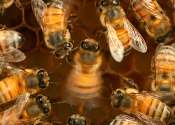Complex learned social behavior discovered in bee's 'waggle dance'
Passing down shared knowledge from one generation to the next is a hallmark of culture and allows animals to rapidly adapt to a changing environment.

Passing down shared knowledge from one generation to the next is a hallmark of culture and allows animals to rapidly adapt to a changing environment.
Plants & Animals
Mar 9, 2023
5
192

The size of the human brain expanded dramatically during the course of evolution, imparting us with unique capabilities to use abstract language and do complex math. But how did the human brain get larger than that of our ...
Biotechnology
Feb 19, 2015
12
1216

(Phys.org)—Google on Tuesday released its first stable version of Dart SDK. Dart is a programming language for Web applications that Google thinks will offer an improved, easy to learn, high performance environment for ...

Johanna Nichols, a linguist at the University of California, Berkeley, has used her pioneering work in the field of language history to learn more about language development in North America. She has found that it can be ...

Language researchers have studied how mothers speak to their infants, to their pets, and to other adults. Mothers speak slowly and clearly to their infants, hyperarticulating speech to teach language. What this research did ...
Social Sciences
Oct 12, 2023
0
121

Cognitive and computer scientists at the University of Toronto, Universitat Pompeu Fabra and the Catalan Institution for Research and Advanced Studies have found child language development and the historical evolution of ...
Social Sciences
Jul 27, 2023
0
62

As a species, humans are constantly interpreting signals to assess social situations and make predictions about what could happen next. Being able to tell if someone else, whether human or animal, is happy with us, about ...
Plants & Animals
Dec 7, 2022
0
146

A study by the University of York and Aarhus University has revealed that baby talk displays similar properties across 36 languages.
Social Sciences
Oct 10, 2022
0
103

A new study by social media researchers at the University of Sydney and QUT has found conspiracy theories are thriving on YouTube despite the platform's efforts to harden posting rules and guidelines.
Social Sciences
Oct 6, 2022
24
129

Language distinguishes us humans; we learn it through experience and social interactions. Especially in the first year of life, human vocalizations change dramatically, becoming more and more language-like. In our closest ...
Plants & Animals
Jun 30, 2021
0
20
Since language development is the crucial part of the human cognitive nature, understanding language development is an important aspect to understand the base and to recall its various components of linguistics. And as to their universality, the cognitive aspect of communication in language is understood as similar among primates, non-primates, and human in some aspects, and differs in other aspects in term of:
Language development is a process starting early in human life, when a person begins to acquire language by learning it as it is spoken and by mimicry. Children's language development moves from simple to complex[citation needed]. Infants start without language. Yet by four months of age, babies can read lips and discriminate speech sounds. The language that infants speak is called babbling.
Usually, language starts off as recall of simple words without associated meaning, but as children grow, words acquire meaning, with connections between words formed. In time, sentences start as words are joined together to create logical meaning. As a person gets older, new meanings and new associations are created and vocabulary increases as more words are learned.
Infants use their bodies, vocal cries and other preverbal vocalizations to communicate their wants, needs and dispositions. Even though most children begin to vocalize and eventually verbalize at various ages and at different rates, they learn their first language without conscious instruction from parents or caretakers. In fact research has shown that the earliest learning begins in utero when the fetus can recognize the sounds and speech patterns of its mother's voice.
This text uses material from Wikipedia, licensed under CC BY-SA